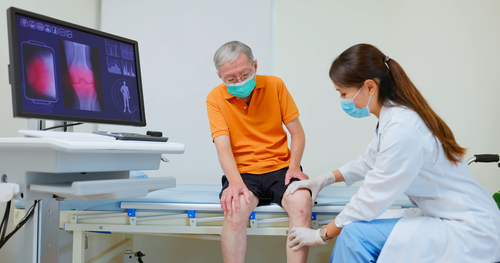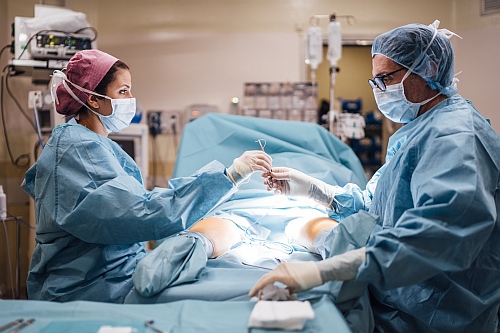Managing pain and stiffness all over the body is a real pain. Whether it’s from rheumatoid arthritis, psoriatic arthritis, or just plain old wear and tear of aging, it can impact daily activities and overall life. While home remedies and over-the-counter meds can give temporary relief, chronic or severe joint pain requires professional help.
In this blog, we’ll talk about the causes of joint pain and stiffness, how to manage your pain, ease pain, and when to see an Atlanta pain management expert.
Causes of Joint Pain and Stiffness
Understanding the causes of joint pain and stiffness is key to treatment. Many things can cause these issues from arthritis to infections to injuries. Here we’ll break down the most common causes.
Arthritis
Arthritis is the number one cause of joint pain and stiffness. This group of conditions can affect one or more joints and cause inflammation and discomfort. Here are some of the most common types:
- Rheumatoid arthritis: An autoimmune disorder that causes chronic inflammation in the joints, often resulting in pain and swelling.
- Osteoarthritis: A degenerative joint disease caused by wear and tear on the cartilage, resulting in pain and stiffness.
- Psoriatic arthritis: Associated with psoriasis, this condition can cause joint inflammation and discomfort.
- Gout: A type of inflammatory arthritis that causes sudden, severe pain, often in the big toe, due to uric acid crystals. The affected joint may experience swelling, tenderness, and difficulty in movement during flare-ups.
Autoimmune Diseases
Autoimmune diseases can also cause joint pain and stiffness. Here are some:
- Systemic lupus erythematosus (lupus): A chronic condition that can affect multiple systems in the body and cause joint pain and fatigue. Autoimmune diseases cause the immune system to attack healthy tissues, leading to inflammation and pain in the joints.
- Fibromyalgia: A systemic condition that causes widespread pain, tenderness, and stiffness in the muscles and joints.
- Reactive arthritis: Occurs after an infection in another part of the body and causes joint inflammation and pain.
Infections
Infections can also cause joint pain. Here are some:
- Viral infections: Conditions like the flu or COVID-19 can cause joint pain and stiffness as part of the symptoms.
- Bacterial infections: Septic arthritis is a serious condition where bacteria infects a joint and causes severe pain and swelling. Assessing the function of the nervous system can provide insights into the underlying causes of joint pain, especially when symptoms are present in multiple areas of the body.
Injuries and Overuse
Injuries and overuse can also cause joint pain. Here are some:
- Fractures and sprains: Injuries to the joint can cause immediate pain and swelling.
- Overuse injuries: Repetitive motion can cause strain on the joints and result in pain and stiffness.
Fibromyalgia
Fibromyalgia is a systemic condition that affects the whole body and causes widespread joint pain and stiffness. It also causes fatigue and sleep disturbances making it a tough condition to manage.
Symptoms
Understanding the symptoms of joint pain and stiffness is key to identifying the underlying issue and seeking treatment. Symptoms can vary from person to person but they often have common characteristics.
Pain Characteristics
Joint pain can manifest in many ways. You may experience:
- Achy feelings all day.
- Sharp or stabbing pain when you move.
- Burning or throbbing feeling in the area.
- Grating sensation when you move the joint which can mean wear and tear.
These pain characteristics can affect daily activities and overall well-being. Additionally, certain factors can make the pain worse, such as specific times of the day like morning or night, or external factors like dehydration or menopause.
Other Symptoms
In addition to pain, you may notice:
- Swelling and stiffness around the joints.
- Difficulty bending or straightening the joint, making simple tasks hard.
- Numbness or weakness in the area, which can limit mobility.
- Warmth around the joint, which means inflammation or infection.
Recognizing these symptoms early can help with management.
Morning Stiffness
Many people experience worse stiffness after periods of inactivity especially in the morning. Morning stiffness can make it hard to get out of bed or start the day. It may take time to loosen up which can be frustrating for those who have it.
Affected Joints
Knowing which joints are commonly affected by multiple joint pains and stiffness can help in identifying the underlying issue and seeking treatment. Joint pain can occur in many areas of the body and affect daily activities and quality of life.
Multiple Joints
Many people experience joint pain in multiple areas of the body. Commonly affected joints are:
- Knees: Knee pain is common, especially among those with arthritis or injuries.
- Hips: Hip pain can restrict movement and cause stiffness. This pain is often centered in the joint where the thigh bone connects to the pelvis and can be caused by conditions like arthritis or injuries.
- Hands: Joint pain in the hands can affect grip strength and daily tasks.
- Feet: Gout can cause severe pain in the big toe and other areas of the foot.
- Shoulders: Stiffness and pain in the shoulders can limit arm movement.
- Spine: Pain in the spine can be due to many conditions including wear and tear.
Specific Joints
Some joints may have specific conditions that cause pain and stiffness:
- Hallux Rigidus (Big Toe): This condition causes stiffness and pain at the base of the big toe making it hard to walk comfortably.
- Sternoclavicular Joint Pain: Pain in the sternoclavicular joint where the collarbone meets the breastbone can be due to injury or inflammation.
Treatment and Relief
Finding the right treatment for joint pain and stiffness is key to improving quality of life. At GA Spine we have various approaches to suit individual needs. Here are some of the ways to relieve pain and improve joint function.
Rest and Ice
Resting the joint is key. Taking a break from activities that aggravate the pain can help. Applying ice packs to the area can reduce inflammation and numb sharp pain. Use ice for 15-20 minutes several times a day, especially after activity.
Medications
Several medications can help with joint pain and stiffness:
- Nonsteroidal anti-inflammatory drugs (NSAIDs): These are used to relieve pain and reduce inflammation. Over-the-counter options are ibuprofen and naproxen.
- Corticosteroids: These prescription medications can quickly reduce inflammation and are used for severe symptoms.
- Antibiotics: If joint pain is caused by bacterial infection, antibiotics may be needed to treat the underlying condition.
- Uricosuric medications: These are used for gout to lower uric acid levels.
Physical Therapy
Physical therapy is important in the recovery. A trained therapist can guide exercises to improve joint function and reduce pain. They may also suggest ways to do daily activities to minimize stress on the joints. Occupational therapy can help in adapting tasks to reduce discomfort.
Surgical Options
In some cases, surgery may be needed to relieve joint pain. Options are:
- Arthroscopy: A minimally invasive procedure to diagnose and treat joint problems.
- Joint fusion: This surgery helps stabilize painful joints by fusing the bones.
- Osteotomy: This involves reshaping bones to relieve pressure on the joint.
- Joint replacement surgery: In severe cases, replacing the joint with an artificial one may be the best option.
When to See a Doctor
Knowing when to seek medical help for joint pain and stiffness is important. Not all discomfort needs immediate attention but some symptoms may indicate more serious underlying conditions. Here’s what to look out for.
Persistent Pain
If you have severe or ongoing pain that affects your daily activities or sleep, see a doctor. This type of pain may mean a more serious condition such as severe arthritis or autoimmune disease. Ignoring persistent pain may lead to further complications or worsening of symptoms.
Other Symptoms
Look out for other symptoms that may indicate a more serious condition. These are:
- Fever and High Temperature: If you have a fever with joint pain, it may mean infection or an inflammatory condition.
- Feeling Unwell: A general feeling of being unwell or fatigued may be with autoimmune diseases or infections.
- Severe Symptoms: Chest pain, difficulty breathing, or sudden changes in your condition should be seen by a doctor immediately. These symptoms may mean life-threatening conditions that need emergency care.
Visit an Atlanta Pain Management Expert ASAP!
If you’re struggling with joint pain and stiffness, don’t let it take over your life. Our team at Georgia Spine & Orthopaedics is here to help you find lasting relief with personalized, expert care. Whether you’re dealing with chronic arthritis, joint inflammation, or another painful condition, we offer a range of advanced treatment options tailored to your needs.
Schedule a consultation with us today at 678-929-4494!






